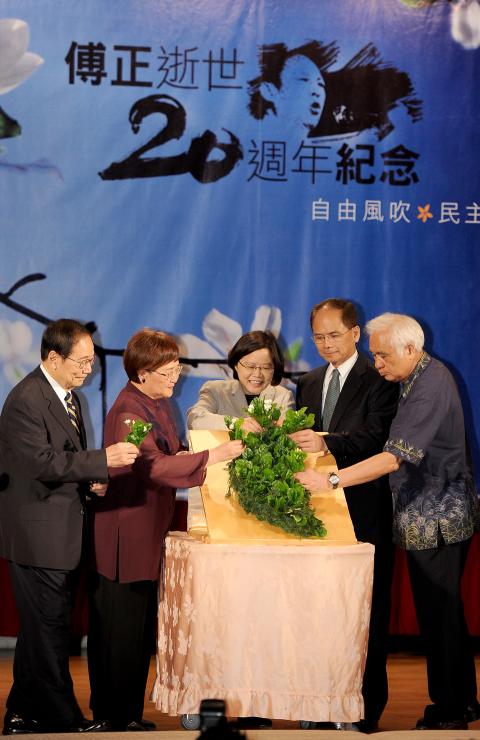Democratic Progressive Party (DPP) presidential candidate and party chairperson Tsai Ing-wen (蔡英文) lauded late democratic activist Fu Cheng’s (傅正) life-long contribution to Taiwan at a commemorative event held yesterday to mark the 20th anniversary of his death.
The commemoration took place at Taipei’s Grand Hotel — the site where he and other democracy activists founded the DPP in 1986.
“On Sept. 28, 1986, the DPP was formed at the Grand Hotel. Today, at the same place, we hold a memorial ceremony for one of the party’s funding fathers, democracy activist Fu Cheng,” Tsai said in her speech.

Photo: Liu Hsin-de, Taipei Times
Fu, born in 1927 in China’s Jiangsu Province, was a stalwart Chinese Nationalist Party (KMT) member who in the 1940s worked as an instructor for KMT political thought officers.
As a close associate of Chiang Ching-kuo (蔣經國), the son of dictator Chiang Kai-shek (蔣介石), Fu followed the Chiangs to Taiwan and continued to work in the KMT’s political education unit.
However, Fu soon realized the government did not intend to implement democracy at all.
In the 1960s, Fu expressed his discontent with the government in Free China (自由中國), a publication that advocated liberalism and was sharply critical of the KMT. He was thrown in jail for founding the China Democracy Party that advocated reform with then-democracy activist Lei Chen (雷震). Fu spent more than six years in prison.
In her speech, Tsai praised Fu for devoting himself to the push for democracy after his release from prison.
In 1986, Fu thought the dangwai (黨外, outside the party) movement was not enough and believed founding an opposition party was necessary.
Fu belonged to the “Committee of 10,” the 10 founders of the DPP that included Kaohsiung Mayor Chen Chu (陳菊) and former premiers Frank Hsieh (謝長廷) and Yu Shyi-kun .
Tsai said that during the KMT’s authoritarian rule, Fu could very well have lived a glamorous life of power, but instead he chose the road filled with thistles and thorns by standing side-by-side with the people in defense of justice and truth, and in the pursuit of democracy and human rights.
“Fearless in the face of the authoritarian regime, Fu transcended ethnic and partisan divides with democratic values and let his successors understand that one should cherish the hard-fought fruit of democracy,” Tsai said, suggesting that work remains undone and that the party needs to stay united in its bid to win the presidential election next year.
Former premier Su Tseng-chang (蘇貞昌) did not join the ceremony yesterday, triggering speculation that Su was avoiding meeting with Tsai after his defeat in the DPP presidential primary.
When asked for comment on his relations with Tsai at a separate setting yesterday, Su said they have not contacted each other since Tsai won the presidential primary. Tsai yesterday said she would soon pay visits to and seek advice from senior DPP members, including Su.

Alain Robert, known as the "French Spider-Man," praised Alex Honnold as exceptionally well-prepared after the US climber completed a free solo ascent of Taipei 101 yesterday. Robert said Honnold's ascent of the 508m-tall skyscraper in just more than one-and-a-half hours without using safety ropes or equipment was a remarkable achievement. "This is my life," he said in an interview conducted in French, adding that he liked the feeling of being "on the edge of danger." The 63-year-old Frenchman climbed Taipei 101 using ropes in December 2004, taking about four hours to reach the top. On a one-to-10 scale of difficulty, Robert said Taipei 101

Nipah virus infection is to be officially listed as a category 5 notifiable infectious disease in Taiwan in March, while clinical treatment guidelines are being formulated, the Centers for Disease Control (CDC) said yesterday. With Nipah infections being reported in other countries and considering its relatively high fatality rate, the centers on Jan. 16 announced that it would be listed as a notifiable infectious disease to bolster the nation’s systematic early warning system and increase public awareness, the CDC said. Bangladesh reported four fatal cases last year in separate districts, with three linked to raw date palm sap consumption, CDC Epidemic Intelligence

Two Taiwanese prosecutors were questioned by Chinese security personnel at their hotel during a trip to China’s Henan Province this month, the Mainland Affairs Council (MAC) said yesterday. The officers had personal information on the prosecutors, including “when they were assigned to their posts, their work locations and job titles,” MAC Deputy Minister and spokesman Liang Wen-chieh (梁文傑) said. On top of asking about their agencies and positions, the officers also questioned the prosecutors about the Cross-Strait Joint Crime-Fighting and Judicial Mutual Assistance Agreement, a pact that serves as the framework for Taiwan-China cooperation on combating crime and providing judicial assistance, Liang

US climber Alex Honnold left Taiwan this morning a day after completing a free-solo ascent of Taipei 101, a feat that drew cheers from onlookers and gained widespread international attention. Honnold yesterday scaled the 101-story skyscraper without a rope or safety harness. The climb — the highest urban free-solo ascent ever attempted — took just more than 90 minutes and was streamed live on Netflix. It was covered by major international news outlets including CNN, the New York Times, the Guardian and the Wall Street Journal. As Honnold prepared to leave Taiwan today, he attracted a crowd when he and his wife, Sanni,